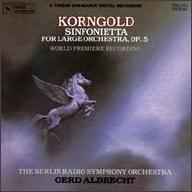Albrecht was born July 19, 1935, in Essen, Germany. His father, Hans Albrecht, was a noted musicologist. Albrecht sang in a choir in his teens and took up conducting at 16. In 1955, he enrolled at the Musikhochschule Hamburg, studying with Hans Brückner-Rüggeberg and also taking classes in musicology, philosophy, and art at Hamburg and Kiel Universities. He gravitated toward conducting after winning prizes in 1957 at the International Young Conductors Competition in Besançon, France, and at the Hilversum Conductors Competition the following year. Posts then began to come his way, first as a repetiteur at the Stuttgart State Opera, and then, in 1963, as principal conductor of the Mainz City Opera. Many of the posts from the first part of Albrecht's career were concerned with opera: he served as music director of the Bühnen Lübeck (1962-1966) and the Kassel Staatsoper (1966-1972), and then as principal conductor of the Deutsche Oper Berlin, succeeding Lorin Maazel. In Kassel, he instituted a series of children's events; he would stress this activity for the rest of his career and even wrote a set of fairy tales for children.
In 1975, Albrecht took an additional position at the Tonhalle-Orchestra of Zurich, remaining there until 1980. In the 1980s, he worked frequently as a guest conductor, developing a reputation as a specialist in German and Central European music from the early 19th century to the contemporary era. In 1988, Albrecht was appointed music director of the Hamburg Staatsoper and the Philharmonisches Staatsoper Hamburg, remaining until 1997. Controversy attended Albrecht's tenure as principal conductor of the Czech Philharmonic; he was the orchestra's first non-Czech director, and the orchestra was split between his backers and those of former conductor Jirí Belohlávek. After taking criticism from Czech President Vaclav Havel, Albrecht resigned in 1996. He later held chief conducting posts at the Yomiuri Nippon Symphony Orchestra (1998-2007) and the Danish National Radio Symphony (2000-2004).
Albrecht had a heavy recording schedule beginning in the mid-1980s; in the year 1995 alone, he released 11 separate recordings. He recorded for many different labels, including Koch, Capriccio, and Wergo, often conducting difficult contemporary German works with a variety of orchestras. He remained active until the end of his life, on February 2, 2014, in Berlin, and several of his recordings were posthumously released. ~ James Manheim, Rovi












